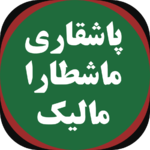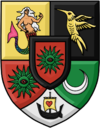Pashqari People's Party
Pashqari People's Party | |
|---|---|
 | |
| Leader | Lukas Pondstone (last) |
| Founded | 2013 |
| Dissolved | 2015 |
| Headquarters | Tegula |
| Ideology | Pashqari interests Pashqari nationalism Social democracy |
| Political position | Centre-left |
| National affiliation | Progressive Coalition |
| Colors | Black, green, red |
| Party flag | |
 | |
The Pashqari People's Party (Pashqar: ﭘاشقاری ﻣاشطارا ﻣالیک, Pashqari Mäshtharah Mälik), sometimes known by its Pashqar acronym, PMM, was a political party in Sabia and Verona. It was founded in 2013 by the Marlaryen brothers, Daro, Obrim, and Shassel. It sought to represent the interests of the Pashqari minority, who lived mainly in the Verona Region, and who spoke Pashqar.[1]
Shortly after its foundation in 2013, it joined the anti-Bleuberrist Progressive Coalition, and supported Ann Stefanović's bid to become prime minister in the September 2013 general election. Its first leader was Shassel Marlaryen, who was its Prime Minister candidate in the March 2014 general election. Following Marlaryen's failure to gain the premiership, Lukas Pondstone took over as party leader.
Ideologically, the PMM sought to represent the interests of a loosely organized community by advocating for the formation of a "Pashqari Nation", based in Verona and with special recognition by the Sabioveronese government. The PMM sought to change the name of the Verona Region to "Pashqaria", to match its Pashqar name. The party had close ties to the chieftain of the Pashqaris, Mazandaran, and the Fäkhist school of the Pahunist Church. The party often employed Pashqari nationalist imagery in campaigns and rallies; its official colors were those of the Pashqari Nation (black, red and green) and its flag and logo used the Pashqari Arabic script. The party also briefly went by the name of "Welïdh" ("Hope", in Pashqar).
In 2014, the party expanded its program beyond Pashqari interets to include a progressive, environmentalist, left-of-center platform that included the creation of new national parks and the legalization of narcotics. Additionally, following the annexation of Lycem into Sabia and Verona, many Lyceni saw the PMM as a viable alternative to the hegemonic Sabian-centric parties like Unity and the Left (though Convergence and Amity remained the Lyceni interest party per excellence). This allowed it to gain popularity and votes outside Verona; in September 2014, one of the party's two elected deputies served a constituency in Elinore (Sabia Region).
Electoral results
| Election year | # of votes | % | seats won | +/- | Government | Ref. |
|---|---|---|---|---|---|---|
| 2013 II | 50† | 75%† | 3 / 20
|
▲ 3 | coalition gov't | [2] |
| 2014 I | 18 | 18.95% | 2 / 20
|
▼ 1 | in opposition | [3] |
| 2014 II | 13 | 15.29% | 2 / 20
|
in opposition | [4] |
- †: In the September 2013 election, the PMM ran as part of the Progressive Coalition, alongside Initiative for Democracy and the Roots Party
References
- ↑ "Tegula recognises Pashqar language, PMM celebrates". The SiV Phonograph. 18 May 2013. Retrieved 19 July 2018.
- ↑ "Stefanović wins the race" The SiV Phonograph. 15 September 2013. Retrieved 30 October 2017.
- ↑ "Left Alliance wins the election". The SiV Phonograph. 20 March 2014.
- ↑ "Conservative victory: Rivière to become Enkâkourak" The SiV Phonograph. 14 September 2014. Retrieved 8 November 2017.
